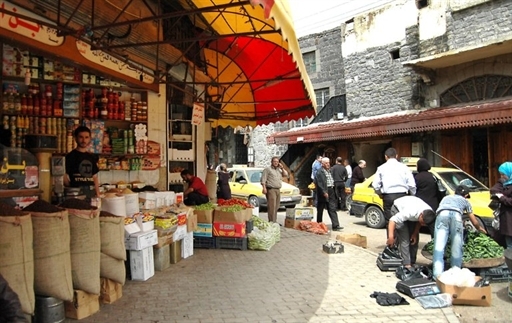 Street Scene in HomsAnthony Shadid writes for The New York Times:
Street Scene in HomsAnthony Shadid writes for The New York Times:
Hotels that catered to sandal-wearing backpackers in the storied Syrian city of Aleppo stand empty. Capital from the Persian Gulf that underpinned Syrian ambitions of modernization has begun to dry up. The Syrian pound has faltered, exports have fallen and the government has promised respite with money it will not have for long.
In his first address to Syrians in two months, President Bashar al-Assad warned this week of “the collapse of the Syrian economy.” The words might have been hyperbole, aimed at rallying support for a leadership staggering from a three-month uprising. But the sentiments underlined the danger the economy there poses for a government that long promised its people better lives, even as it refused to surrender any real political power.
As the crisis deepens, Syrians face the prospect of achieving neither.
“We as businessmen want a solution, and we can’t wait forever,” said Muhammad Zaion, a garment dealer in Aleppo. “The president should find a way out of this crisis, or he should leave it to others. We need a solution, whatever that solution might be.”
For much of the world, Syria’s revolt has been viewed, through its politics, as a reaction to the ferocious crackdown deployed by one of the region’s most authoritarian governments.
But an economy long hailed for its potential — though its stewards have been criticized for its mismanagement — has played no less a role in the upheaval. Market reforms that cut subsidies on food and fuel over the past seven years stoked frustration, worsened by a devastating drought that began in 2006 and drove 1.5 million people from the countryside to cities without enough jobs.
With economists predicting that conditions will worsen over the summer, the health of the economy also may determine how the unrest evolves.
In that, it stands as a case study of the tumult across the Arab world, where political repression has intersected with economic frustration and a more ambiguous sense of humiliation to unleash some of the greatest changes in the region in a generation. Even analysts sympathetic to Mr. Assad acknowledge that his leadership has so far failed to offer a real plan to redress any of those grievances, other than to warn against the alternative to having him in control.
“Three months into this crisis, the regime is not getting its act together on any front, even the economy, despite the fact that the regime’s basis of support relies on that same economy,” said an analyst in Syria who, like many interviewed, spoke on the condition of anonymity because of the fear of retribution. “The regime has no policy and no strategy at this point.”
Since the uprising erupted in mid-March, the most substantial impact on the economy has probably been on tourism, a growing sector that economists say provides $8 billion a year. Though the reports are anecdotal, the numbers seem to have fallen off drastically, save for Iranian pilgrims visiting sacred sites in Damascus. European tourists have changed plans, and the flow of Turks to Aleppo has slowed to a trickle.
One hotel owner in Aleppo, an ancient city and one of the Arab world’s most beautiful, said Europeans last visited his hotel in March.
“By July, I am going to close the hotel,” said the proprietor, who gave his name as Abu George. Rather than firing his employees, he has cut the hours of his staff of 50 in half. “Charity,” he called it.